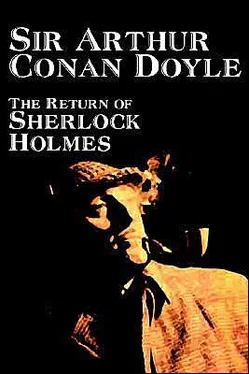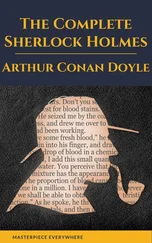Arthur Doyle - The Return of Sherlock Holmes
Здесь есть возможность читать онлайн «Arthur Doyle - The Return of Sherlock Holmes» — ознакомительный отрывок электронной книги совершенно бесплатно, а после прочтения отрывка купить полную версию. В некоторых случаях можно слушать аудио, скачать через торрент в формате fb2 и присутствует краткое содержание. Город: London, Год выпуска: 2004, ISBN: 2004, Издательство: Wildside Press LLC, Жанр: Классический детектив, на английском языке. Описание произведения, (предисловие) а так же отзывы посетителей доступны на портале библиотеки ЛибКат.
- Название:The Return of Sherlock Holmes
- Автор:
- Издательство:Wildside Press LLC
- Жанр:
- Год:2004
- Город:London
- ISBN:0809594382
- Рейтинг книги:3 / 5. Голосов: 1
-
Избранное:Добавить в избранное
- Отзывы:
-
Ваша оценка:
- 60
- 1
- 2
- 3
- 4
- 5
The Return of Sherlock Holmes: краткое содержание, описание и аннотация
Предлагаем к чтению аннотацию, описание, краткое содержание или предисловие (зависит от того, что написал сам автор книги «The Return of Sherlock Holmes»). Если вы не нашли необходимую информацию о книге — напишите в комментариях, мы постараемся отыскать её.
The Return of Sherlock Holmes — читать онлайн ознакомительный отрывок
Ниже представлен текст книги, разбитый по страницам. Система сохранения места последней прочитанной страницы, позволяет с удобством читать онлайн бесплатно книгу «The Return of Sherlock Holmes», без необходимости каждый раз заново искать на чём Вы остановились. Поставьте закладку, и сможете в любой момент перейти на страницу, на которой закончили чтение.
Интервал:
Закладка:
Sherlock Holmes had listened with the utmost intentness to the statement of the unhappy schoolmaster. His drawn brows and the deep furrow between them showed that he needed no exhortation to concentrate all his attention upon a problem which, apart from the tremendous interests involved must appeal so directly to his love of the complex and the unusual. He now drew out his notebook and jotted down one or two memoranda.
“You have been very remiss in not coming to me sooner,” said he, severely. “You start me on my investigation with a very serious handicap. It is inconceivable, for example, that this ivy and this lawn would have yielded nothing to an expert observer.”
“I am not to blame, Mr. Holmes. His Grace was extremely desirous to avoid all public scandal. He was afraid of his family unhappiness being dragged before the world. He has a deep horror of anything of the kind.”
“But there has been some official investigation?”
“Yes, sir, and it has proved most disappointing. An apparent clue was at once obtained, since a boy and a young man were reported to have been seen leaving a neighbouring station by an early train. Only last night we had news that the couple had been hunted down in Liverpool, and they prove to have no connection whatever with the matter in hand. Then it was that in my despair and disappointment, after a sleepless night, I came straight to you by the early train.”
“I suppose the local investigation was relaxed while this false clue was being followed up?”
“It was entirely dropped.”
“So that three days have been wasted. The affair has been most deplorably handled.”
“I feel it and admit it.”
“And yet the problem should be capable of ultimate solution. I shall be very happy to look into it. Have you been able to trace any connection between the missing boy and this German master?”
“None at all.”
“Was he in the master’s class?”
“No, he never exchanged a word with him, so far as I know.”
“That is certainly very singular. Had the boy a bicycle?”
“No.”
“Was any other bicycle missing?”
“No.”
“Is that certain?”
“Quite.”
“Well, now, you do not mean to seriously suggest that this German rode off upon a bicycle in the dead of the night, bearing the boy in his arms?”
“Certainly not.”
“Then what is the theory in your mind?”
“The bicycle may have been a blind. It may have been hidden somewhere, and the pair gone off on foot.”
“Quite so, but it seems rather an absurd blind, does it not? Were there other bicycles in this shed?”
“Several.”
“Would he not have hidden a couple, had he desired to give the idea that they had gone off upon them?”
“I suppose he would.”
“Of course he would. The blind theory won’t do. But the incident is an admirable starting-point for an investigation. After all, a bicycle is not an easy thing to conceal or to destroy. One other question. Did anyone call to see the boy on the day before he disappeared?”
“No.”
“Did he get any letters?”
“Yes, one letter.”
“From whom?”
“From his father.”
“Do you open the boys’ letters?”
“No.”
“How do you know it was from the father?”
“The coat of arms was on the envelope, and it was addressed in the Duke’s peculiar stiff hand. Besides, the Duke remembers having written.”
“When had he a letter before that?”
“Not for several days.”
“Had he ever one from France?”
“No, never.
“You see the point of my questions, of course. Either the boy was carried off by force or he went of his own free will. In the latter case, you would expect that some prompting from outside would be needed to make so young a lad do such a thing. If he has had no visitors, that prompting must have come in letters; hence I try to find out who were his correspondents.”
“I fear I cannot help you much. His only correspondent, so far as I know, was his own father.”
“Who wrote to him on the very day of his disappearance. Were the relations between father and son very friendly?”
“His Grace is never very friendly with anyone. He is completely immersed in large public questions, and is rather inaccessible to all ordinary emotions. But he was always kind to the boy in his own way.”
“But the sympathies of the latter were with the mother?”
“Yes.”
“Did he say so?”
“No.”
“The Duke, then?”
“Good heaven, no!”
“Then how could you know?”
“I have had some confidential talks with Mr. James Wilder, his Graces secretary. It was he who gave me the information about Lord Saltire’s feelings.”
“I see. By the way, that last letter of the Dukes—was it found in the boy’s room after he was gone?”
“No, he had taken it with him. I think, Mr. Holmes, it is time that we were leaving for Euston.”
“I will order a four-wheeler. In a quarter of an hour, we shall be at your service. If you are telegraphing home, Mr. Huxtable, it would be well to allow the people in your neighbourhood to imagine that the inquiry is still going on in Liverpool, or wherever else that red herring led your pack. In the meantime I will do a little quiet work at your own doors, and perhaps the scent is not so cold but that two old hounds like Watson and myself may get a sniff of it.”
That evening found us in the cold, bracing atmosphere of the Peak country, in which Dr. Huxtable’s famous school is situated. It was already dark when we reached it. A card was lying on the hall table, and the butler whispered something to his master, who turned to us with agitation in every heavy feature.
“The Duke is here,” said he. “The Duke and Mr. Wilder are in the study. Come, gentlemen, and I will introduce you.”
I was, of course, familiar with the pictures of the famous statesman, but the man himself was very different from his representation. He was a tall and stately person, scrupulously dressed, with a drawn, thin face, and a nose which was grotesquely curved and long. His complexion was of a dead pallor, which was more startling by contrast with a long, dwindling beard of vivid red, which flowed down over his white waistcoat with his watch-chain gleaming through its fringe. Such was the stately presence who looked stonily at us from the centre of Dr. Huxtable’s hearthrug. Beside him stood a very young man, whom I understood to be Wilder, the private secretary. He was small, nervous, alert with intelligent light-blue eyes and mobile features. It was he who at once, in an incisive and positive tone, opened the conversation.
“I called this morning, Dr. Huxtable, too late to prevent you from starting for London. I learned that your object was to invite Mr. Sherlock Holmes to undertake the conduct of this case. His Grace is surprised, Dr. Huxtable, that you should have taken such a step without consulting him.”
“When I learned that the police had failed——”
“His Grace is by no means convinced that the police have failed.”
“But surely, Mr. Wilder——”
“You are well aware, Dr. Huxtable, that his Grace is particularly anxious to avoid all public scandal. He prefers to take as few people as possible into his confidence.”
“The matter can be easily remedied,” said the brow-beaten doctor; “Mr. Sherlock Holmes can return to London by the morning train.”
“Hardly that, Doctor, hardly that,” said Holmes, in his blandest voice. “This northern air is invigorating and pleasant, so I propose to spend a few days upon your moors, and to occupy my mind as best I may. Whether I have the shelter of your roof or of the village inn is, of course, for you to decide.”
Читать дальшеИнтервал:
Закладка:
Похожие книги на «The Return of Sherlock Holmes»
Представляем Вашему вниманию похожие книги на «The Return of Sherlock Holmes» списком для выбора. Мы отобрали схожую по названию и смыслу литературу в надежде предоставить читателям больше вариантов отыскать новые, интересные, ещё непрочитанные произведения.
Обсуждение, отзывы о книге «The Return of Sherlock Holmes» и просто собственные мнения читателей. Оставьте ваши комментарии, напишите, что Вы думаете о произведении, его смысле или главных героях. Укажите что конкретно понравилось, а что нет, и почему Вы так считаете.












